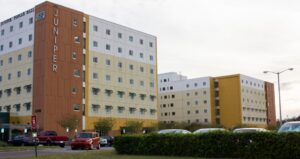Custodial staff shortages prompt new cleaning measures, application incentives for residence halls

Resident Services implemented new practices to attract employee applicants, including raising residential custodians wages, due to understaffing in residential halls across campuses.
Since the end of 2019, there has been a decrease in cleaning staff due to changes in the market and complications caused by COVID-19, according to Assistant Vice President of Housing and Residential Education Ana Hernandez.
The shortage of custodial staff was not an issue during the 2020-21 academic year because fewer students were on campus. However, with the return to in-person operations, cleaning staff have been spread thin to accommodate the increase in activity on campus.
“Last year, we had fewer residents that were on campus, and so the shortages were not as pronounced as when everybody came back,” Hernandez said. “We’re at over 95% occupancy right now. We’re trying to get back up to what we believe we need to service the communities best.”
Cleaning staff numbers are 20% below normal, according to Hernandez. She said the shortage is attributed to the hard nature of the work, which has been complicated by the pandemic. The custodial staff were required to fulfill their duties, while also maintaining COVID-19 safety protocol.
“With the remote work activity with COVID-19, things have been more complex,” Hernandez said. “It’s an issue that’s being experienced for frontline staff throughout the Tampa Bay area, as well as nationally.”
Due to the staff shortages, residents of Juniper-Poplar Hall received an email Nov. 4 announcing bathroom cleanings would be reduced to once every two weeks rather than once a week.
“All suite bathrooms in [Juniper-Poplar Hall] will be cleaned biweekly for now in hopes of returning to weekly cleaning in the spring semester,” Juniper Hall Residence Life Coordinator Hannah Majka said in the email.
Some residents, such as freshman Anamaria Correa-Castano, said she felt frustrated by having to take part of a responsibility handled by residential custodians.
“I don’t want to clean things that I expect to be cleaned [by custodial staff],” Correa-Castano said.
Correa-Castano said she and her suitemates planned how they want to manage the cleanliness of the bathrooms during the biweekly cleanings.
“For the biweekly schedule, we had to discuss with our suitemates the difference and the bathroom situation, how we deal with things especially,” said Correa-Castano.
“Now that it has changed [to a biweekly schedule], more stuff has accumulated … We just asked our suitemates to be more mindful and everybody else in the room to be more mindful.”
Despite the changes in the cleaning schedule, geology major Megan Hipple said she was grateful for the work the staff does and understands the understaffing challenge.
“[The residential custodians] do a really good job. I’m really grateful that we don’t have to split bathroom cleaning duties between four girls,” Hipple said.
Juniper-Poplar is not the only residential hall to be affected. Custodial staff are assigned throughout the campus as needed and are not assigned to a single hall, so the shortage is affecting other residential areas as well, according to Hernandez.
“We take an approach that all of the residential communities are serviced by all of the Housing and Residential Education staff,” Hernandez said. “So where we have shortages, or where we have an excess demand, we reallocate staff as needed.”
As a way to deal with the issue and advertise the position, Resident Services changed the description of the position and increased wages from $12 an hour to $15 in the past month to encourage new applicants. Employees also receive benefits such as paid vacation, sick leave, insurance benefits and retirement plans.
Most custodial positions are created for corporate offices and conducted after hours when the area is empty. A residential custodial position, however, requires student interaction since the staff cleans where students are actively living and working.
Hernandez said the advertised position description has been adjusted to include the interaction applicants will have with the students.
“The custodial staff in the residential population are part of the community, and at times are the staff that our residential students see the most often, in and around their buildings,” Hernandez said. “We want to make sure that we have staff that are on board, that they understand that dynamic and really contribute to that and our students’ success.”
Residential custodians have not yet experienced an increase in the number of employees since the wages were increased, according to Hernandez, but she expects the team will return to its standard operations in the spring semester.
“We want to make sure that we are supporting staff and recognizing that they’re an essential part of our residential communities,” Hernandez said.
Additional reporting by Brandon Rush.








